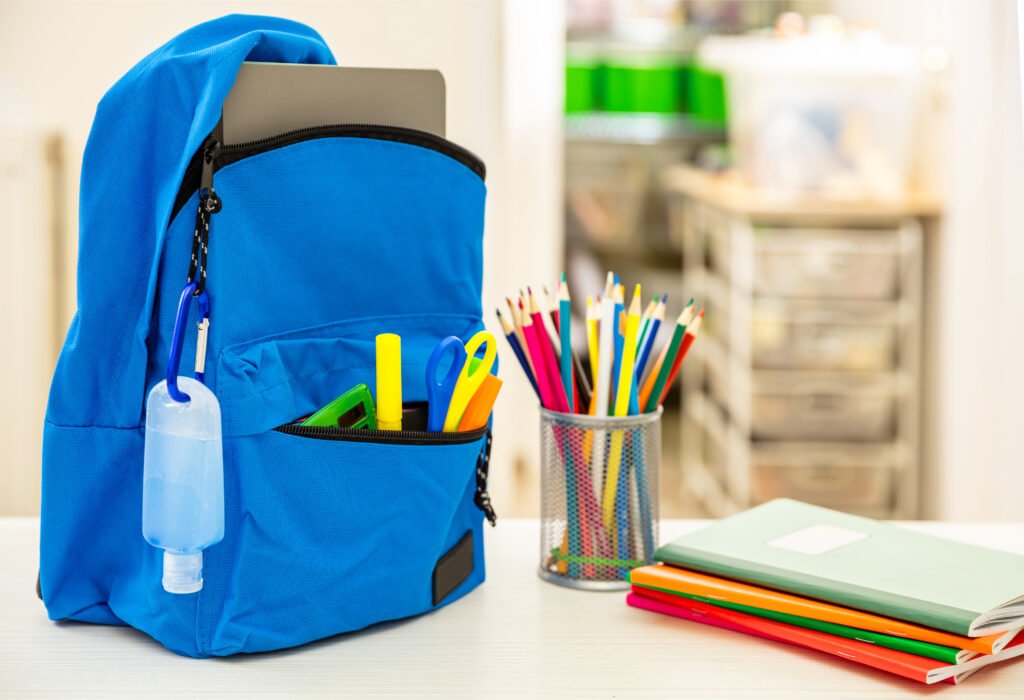When the school year starts—with classes, sports, clubs, friends, and homework—it’s easy to feel pulled in every direction. I’ve found that starting the year with a few clear strategies helps me feel more in control and less overwhelmed.
A lot of what I’ve learned about building strong habits comes from the book Atomic Habits by James Clear, which shows how small changes in your environment, routines, and mindset can lead to big results. The strategies I share below are grounded in that same idea: make it easier to follow through by setting yourself up for success.
Step 1: Set up your space for success
Clear says that “environment is the invisible hand that shapes behavior.” That means your surroundings have a big influence on what you actually do. When your space is set up for focus, like a clean desk with only what you need, you’re more likely to stay on task without even thinking about it.
What works for me:
- Create a study zone. Choose one spot where you always do schoolwork and keep only what you need for studying there.
- Remove distractions before starting. Put your phone in another room or turn on “Do Not Disturb.”
- Break large assignments into smaller steps. If a project is due in two weeks, set mini-deadlines so you’re making steady progress.
- Keep essentials where you can see them. If you need sports gear or forms for the next day, put them by the door the night before.
Step 2: Lock in with repeatable routines
According to Atomic Habits, “every action you take is a vote for the type of person you want to become.” Building a routine helps you cast those votes without overthinking. Doing your tasks the same way each time turns them into habits, which saves your brain energy and makes it easier to get started—especially when you’re tired or stressed.
What works for me:
- Morning launch list. Write down the 4–5 things you need to do every morning (get dressed, pack lunch, check bag, grab phone/keys) and keep it in a visible spot.
- Homework start-up routine. Clear your desk → open your planner → start with the easiest task → take a 5-minute break after 25 minutes.
- Weekly organization check. Pick one day each week to go through your backpack or locker, throw away trash, file papers, and restock supplies.
- Use visuals. Post checklists on your wall or save them as your phone’s lock screen so you see them often.
Step 3: Make rewards part of the plan
Clear also talks about “temptation bundling,” which means pairing something you need to do with something you enjoy. It’s a way to train your brain to look forward to a task instead of dreading it. Giving yourself rewards after focused work sessions helps new habits stick and makes hard things feel more doable.
What works for me:
- Short rewards after work blocks. After 30 minutes of focused study, take a short break to do something you enjoy—listen to a song, have a snack, or text a friend.
- Points system. Give yourself points for each completed task and trade them for a bigger reward, like a movie night or extra time with friends.
- Pair tasks with something you like. Listen to your favorite playlist while reviewing notes.
- Tell someone your goal. Share what you’re working on with a friend or family member so they can cheer you on when you make progress.
Final thought
Executive functioning skills don’t develop overnight, but small, consistent actions can lead to big changes. By setting up your space, building repeatable routines, and making rewards part of the process, you’re training your brain to work smarter, not harder. These habits help you feel more organized, less overwhelmed, and better equipped to handle whatever the school year throws your way. Every time you take action, you’re shaping the kind of student and leader you want to become.
FOR PARENTS >>>
How to support your teen’s back-to-school start
When teens work on building executive functioning skills, they often need both structure and encouragement. At the start of the school year, small, steady support can make a big difference.
What you can do:
- Help set up an effective study space. Encourage your teen to choose a consistent spot for schoolwork that’s free of unnecessary distractions.
- Promote routines over reminders. Instead of telling your teen each step to take, help them create a visible checklist they can follow independently.
- Model time management. Share how you plan your own week or break down a large task, so they can see strategies in action.
- Acknowledge effort. Recognize when your teen follows through on a routine or meets a goal—it reinforces progress and builds confidence.
Remember, executive functioning skills continue developing into early adulthood. Your role isn’t to remove all obstacles, but to help your teen see challenges as problems they can solve.
Sources and further reading
- Clear, J. (2018). Atomic habits: An easy & proven way to build good habits & break bad ones. https://jamesclear.com/atomic-habits
- Johnson, D. (2005). The organized student: Teaching children the skills for success in school and beyond. https://www.amazon.com/Organized-Student-Teaching-Children-Success/dp/0743270207
- Parents Editors. (2023, August 21). Day and night: The back-to-school routine. Parents. https://www.parents.com/day-and-night-the-back-to-school-routine-7511704
- Calhoun, K. (2023, April 10). The role of routines in executive functioning. Medium. https://medium.com/@efbombcoach/the-role-of-routines-in-executive-functioning-fefcc3275291



